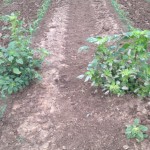by Dr. Calvin Trostle, Extension Agronomy, Lubbock
Texas producers for both grain sorghum and sunflower can access current AgriLife summary information on grain sorghum and sunflower herbicides. Both guides were prepared by Dr. Calvin Trostle, Extension agronomist/state sunflower specialist, Lubbock; and Dr. Joshua McGinty, Extension agronomist/weed control, Corpus Christi.
These guides do not provide specific advice about which herbicide to use or what might be best; rather these documents are oriented toward improving producer awareness of known labeled active ingredients (primarily by brand name or original herbicides). In many cases there are numerous generics that may also be available. These planning tools will assist producers seeking additional options for weed management in Texas grain sorghum or sunflower production. It is tedious to study many different labels to determine application rates, timing, rotation restrictions, and other guidelines for herbicides. Thus many of these key points are listed. Once you decide to consider a possible herbicide on this list that you may not have used before, be sure to thoroughly review the product label. These guides are not a substitute for herbicide product labels.
Grain Sorghum
2015 Texas Grain Sorghum Weed Control & Harvest Desiccation Guide, available at http://lubbock.tamu.edu/programs/crops/sorghum/. This guide may also be of some assistance with weed control decisions in sorghum family forages, but many of these active ingredients are not labelled for forage crops.
Additional information, Huskie herbicide: Since Huskie herbicide was introduced in 2011 there have been several label changes. This herbicide offers an additional strategy for control of glyphosate-resistant Palmer ameranth species of pigweed, but there are specific use instructions, label rotation restrictions (especially cotton; some rotational injury in the Texas High Plains in dry years), etc. For further information on Huskie and its use, consult “2015 Sorghum Pointers for use of Huskie Herbicide,” at the above URL.
Sunflower
2015-2016 Texas Sunflower Weed Control & Desiccation Guide, available at http://lubbock.tamu.edu/programs/crops/sunflowers/
Your most important weed control decision?
With the advent of a growing number of herbicide-resistant weeds in Texas crops, we assert that your most important weed control decision is what you do for pre-plant/pre-emerge weed control. Far too many acres in Texas across many different crops have relied heavily—even exclusively—on over-the-top weed control. But this increases the chances of escapes not to mention further fostering the potential development of weed resistance, which is much more likely in the absence of multiple chemistries and modes of action. Use pre-plant/pre-emerge applications, coupled with mechanical control where appropriate, as your first line of defense against weeds, then use your in-season over-the-top herbicides to reduce and eliminate escapes and attack new in-season emerging weed issues.

Calvin Trostle
Professor and Extension Agronomist
Lubbock, TX
803.746.6101
ctrostle@ag.tamu.edu

